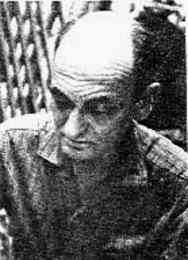Yonathan Ratosh
יונתן רטוש

Yonathan Ratosh (1908-1981) was born Uriel Halperin in Warsaw, Poland. His family, which spoke Hebrew at home, immigrated to Eretz Israel in 1921.He published his first poem in 1926. Ratosh studied at the Hebrew University and at the Sorbonne. In the mid-1930s, he edited the Revisionist movement’s newspaper and was active in right-wing underground organizations. In 1939, he founded the Canaanite movement, which rejected both religion and Jewish nationalism. This group promoted the theory of a shared cultural heritage for the entire Middle East. He founded and co-edited Alef, a widely translated literary journal, that included the works of Stendhal, Camus, Shaw and O’Neill. Ratosh was awarded the Prime Minister’s Prize.
The literary expression of the Canaanite movement was strongly influenced by an ancient, pre-biblical mythology and vocabulary, and Ratosh’s own work is closely linked to the movement’s political theory. The poems of his early period are marked by a strict structure, playing with rhyme and repetition to create an almost hypnotic effect. In contrast, Ratosh’s later work sheds these tools and instead employs a colloquial diction and more contemporary style. In spite of the changes, his structure and metre remain unconventional and thus uniquely individual. While the movement founded by Ratosh was never broad, T. Carmi wrote that “its emphasis on myth and its stylistic mannerisms had considerable impact on contemporary poetry.”

